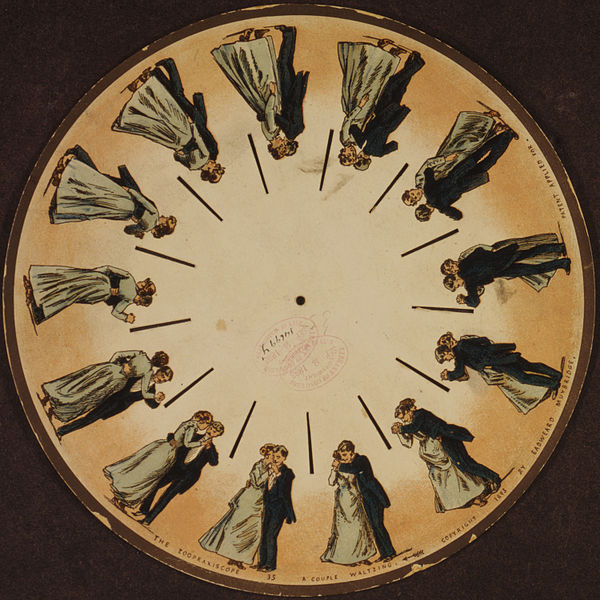These are most likely incoherent notes (really draft thoughts) that I’ve collected in the various digital spaces I jot down notes to myself collected in one place. I was hoping there was a way to make them make sense but I don’t think there is. The topic is empathy because I personally have a hard time with it and spend a lot of time thinking about it as I try to make sense of how we humans interact in my own head. It often seeps into my work and rants. Please note these are just my thoughts and not a judgment on anyone else. If empathy works for you, keep at it.
I sort of understand where you are coming from, but rather than claiming empathy I offer you my solidarity.
https://twitter.com/jadedid/status/592821788490465280
Biography
I grew up knowing there were people who would rather see me hanging from a tree in their yard than have me as a guest at their dinner table. Still, I was raised to try to understand and empathize with people despite their hatred, shortcomings, etc. That would somehow make me “better”. I never quite knew what it would do for them, though, or my safety.
In 4th grade, we read Number the Stars and I became mildly obsessed with understanding what makes something as horrific as the Shoa (Holocaust at the time) happen. By the middle of 6th grade, I wondered why there weren’t as many books on slavery? Why was it that it was so easy for me to get books on the Shoa but there were no resources for me to learn about the holocaust of my own people, even as I knew that there were places I was not welcome, where people would want to hurt me for just being in their neighborhood. Instead of “never forget” for me and my family it was “get over it”. To the credit of the special school where I was a student, instead of Columbus day we had resistance festivals and we watched Mississippi Burning and took a field trip to see Malcolm X at the theatre… festivals and dramatized films circulate differently than books in school and other spaces of knowledge production though.
By the early/mid-90s as I was going to middle and then high school I’d moved on to reading books on religion and meditation and massively consuming news. There was so much suffering. I tried to empathize with everyone. Rwanda happened and I cried. When Kosovo started something broke. At school, I was still being told by laughing peers how they could never “bring a black person home” lest their dad kill them. I’d overhear jokes where the punchline was the N word. I remember one year in my yearbook a girl’s senior quote was to her boyfriend “I love you [random dude name], my jew basher”. I went to the teachers and the principle, crying out of anger and fear. Every time I was told that “I didn’t understand the context,” or, “I should lighten up because they are just jokes”. But my family passed down the memory of those who would rather see me in a tree than a guest at their dinner table. If they were willing to kill their sons for knowing they spoke to someone like me, what might they do to me for existing? I had nothing left to understand.
At 16 I no longer had empathy and I started to try and recenter through… whatever I thought meditation was at the time…
I met a man. He grew up Catholic and always thought he would be a priest. But something happened and he left home at 16 and ended up hiking from central Asia to India. In India, he decided he was not going to be a priest. He changed his name to Ramdas and became a monk. As he grew into an adult he had a hard time making sense of some of the oppression that he saw as part of Hinduism. He spoke to one of his gurus, a seer, who told him he wouldn’t stay a monk and that he would get married and have kids. He laughed. A year later, after almost a decade of being a monk. He became Buddhist and came back to the states and enrolled college. He went through and eventually decided to get a Ph.D. in religion. While finishing his Ph.D. he met the woman who would become his wife. In the future they would have two kids and he would teach where I went to undergrad. Ramdas helped me finish working through how to live in this world with so much pain where, as I told him, “I can’t have empathy for people who would sit there and watch the Rwanda genocide happen and do nothing”.
I think he laughed at me. That was one of our later conversations. He said, “Just because you think they did nothing doesn’t mean they actually did nothing.” He said that all over there are people who seem like they are bad who are capable of good. We had lots of talks too, about people who truly believe what they are doing is good even if the results are horrific. I remember after taking a course on eastern and western mysticism I was baffled with where I was in terms of really understanding how intertwined good/evil are… and he finally told me to read some things (that are of course now forgotten) on compassionate love… that I short hand to compassion…. Which is bad. I did, and I realized I can love everyone, as a human, and I could want peace for them. But I didn’t and couldn’t understand everyone. And even if someone believes something they are doing is good and just, it isn’t always. I decided that my goal was to be a more compassionate being going through life. It requires letting go of understanding and expectation. But it also leaves openings for connection and recognition. I am awkward and slow to open up to people, but when I do it is intense. We don’t often get to interact without judgment. This is what compassion allows for me.
Lightly annotated definitions from around the web
Empathy is not Sympathy! Sympathy isn’t bad if love is centered.
Origin
Early 20th century: from Greek empatheia (from em- in + pathos feeling) translating German Einfühlung.
I think Einfühlung is really into feeling… which is sort of different? Or one feeling.
The dictionaries have feelings on it too. Always one sided. Always an “other” or and “object” so I guess empathizing is turning the “other” into an object so I can erase the other and/or strip the other’s agency to make their feelings my own… well, not make them my own, but understand.
empathy
[em-puh-thee]
noun
1.
the psychological identification with or vicarious experiencing of the feelings, thoughts, or attitudes of another.
2.
the imaginative ascribing to an object, as a natural object or work of art, feelings or attitudes present in oneself:
By means of empathy, a great painting becomes a mirror of the self.
Simple Definition of empathy
: the feeling that you understand and share another person’s experiences and emotions : the ability to share someone else’s feelings
Full Definition of empathy
1: the imaginative projection of a subjective state into an object so that the object appears to be infused with it
2: the action of understanding, being aware of, being sensitive to, and vicariously experiencing the feelings, thoughts, and experience of another of either the past or present without having the feelings, thoughts, and experience fully communicated in an objectively explicit manner; also : the capacity for this
NOUN
[mass noun] The ability to understand and share the feelings of another.
Sympathy isn’t bad if love is centered.
noun
1.
a feeling of deep sympathy and sorrow for another who is stricken by misfortune, accompanied by a strong desire to alleviate the suffering.
verb (used with object)
2.
Archaic. to compassionate.
Simple Definition of compassion
: a feeling of wanting to help someone who is sick, hungry, in trouble, etc.
Full Definition of compassion
: sympathetic consciousness of others’ distress together with a desire to alleviate it
com·pas·sion
kəmˈpaSHən/Submit
noun
sympathetic pity and concern for the sufferings or misfortunes of others.
“the victims should be treated with compassion”
synonyms: pity, sympathy, empathy, fellow feeling, care, concern, solicitude, sensitivity, warmth, love, tenderness, mercy, leniency, tolerance, kindness, humanity, charity
“have you no compassion for a fellow human being?”
BUUUUUUUUT really compassionate love… that is the real goal. I’m not there yet. I try though.
Approaches to defining Compassionate Love from wikipedia
According to Underwood’s framework, which has informed a substantial portion of the scientific research, 5 key and defining features of compassionate love include:
- Free choice for the other
- Some degree of accurate cognitive understanding of the situation, the other, and oneself
- Valuing the other at a fundamental level
- Openness and receptivity
- Response of the heart[5]
Maybe someday writing…

deep thoughts on the relationship between empathy/oppression. Readings on empathy outside of performance? I’m also thinking of these things wrt to how they relate to identity and lived experience in digital/non-digital/”seen as ‘other’ contexts. and how the version of self that is “other” is different than the not “not” me but are collapsed into one in digital contexts.
Theoretical Stakes of Empathy and oppression.
With the rise of digital media, people around the world are more connected than ever before. Forms of transportation such as bicycles, boats, and cars, connected clans and civilizations to those beyond where their eyes could see. Connections led to both cultural gains, and catastrophic losses through war and disease. Electronic media was different. Rather than taking people further than they could see, it made that which is further away suddenly appear in high definition as one in front of many without carrying disease or war. In fact, electronic media allowed for individuals to sit in front of disease and war without risk of being contaminated by the losses and risk they might bring. That does not mean that there was no harm in the images and sounds transported through electronic media. Electronic media in many ways annihilated the need for physical war and disease for the destruction of people. Instead, they could be symbolically destroyed in front of an audience of the world. While there is still physical oppression, electronic media, much like the other shared cultural framings of History and Education, oppresses culture on a psychic level. In our current world dominated by digital media and social networks, where everyone is able to have a voice, rather than using that voice to speak to the universal suffering that characterizes humanity, at this point in history, it is still used consciously and subconsciously as a place to further the little bits of power that alleviate some of the psychic pain of our current human condition.
https://twitter.com/jadedid/status/730106017766363136
And there is always Fanon. The explosion will not happen today. It is too soon… or too late. This is empathy for me. It is the never ending distance of your feelings becoming real to me only after they’ve already occurred for you. They are endless misinterpretation and out of timeness with the real. It is Time and the Other. Empathy becomes the inability to recognize the love in yourself in a pursuit that has already failed because the emotions we empathize with are always already the past. If we empathize too soon, we are already too late. We’ve already failed to recognize the human in front of us.
https://twitter.com/jadedid/status/796730695288844288
The oppression of empathy is the call to mutual recognition of the other and a recognition that even I am other for an imagined you that is a reflection of myself. Being empowered is the opposite of oppressed and it is defined by being in a position to continue oppression. Empathy is how we recognize oppression and it is based on the continued alienation of the oppressed in the name of understanding. Empathy, loss, and fear are experienced alone. Even in collective pain, the intensity is individually determined.
https://twitter.com/jadedid/status/768229817942675456
When media, society, and technology theorist Marshall McLuhan coined his famous phrase, “the medium is the message” (1964) he also stated that all technology is an amputation of the human. While McLuhan is often used to explain the role of technology in society, what is missed is that the initial medium for McLuhan is always already the human body and the neural pathways, pathways that pre-exist the electric age, creating meaning through internal electrical impulses that move through the pre-defined pathways of the body that create sensation and meaning. The moment those impulses move outward and try to create meaning or a message, they are already and amputation because all things outside of the body are external even as they represent the individual. Thus, the very act of trying to commune with another human is an act of amputation that we imagine as a cohesive whole through our attempts to empathize and understand. While we get that if someone touches a hot pot they probably experience burning pain (unless their neural pathways are not properly connected, which does happen), and we know that that is an unpleasant experience, we are unable to feel their actual pain. We create a theoretical copy of ourselves to experience the burn of the Other. The medium, the human, is the message of the social imaginary.
Much like Benedict Anderson’s discussion of European’s “discovering” new worlds in the chapter “Old Language, New Model’s” in Imagine Communities, Machine Learning’s new fascination with big data that is bleeding out to other disciplines is a recreation of things already discovered: In order to commune with others we create large patterns that we then re-create. The most obvious example of this would be language. The new models though favor a more mathematical or scientific mind. Rather than being dependent on having a shared language or experience that can be understood with only a theoretical amputation of the self, these require a complete amputation in the form of thinking machines that run without human presence. Machine learning and the big data it analyzes has been so far removed from a theoretical human medium that when humans are reintroduced to the configuration of information, the human is unable to cognitively make sense of where it came from, thus Google’s learning machines out learning their creators and human monitors. Despite the inability of the human to understand the origins of what the machine is putting out, I would still argue that if we go back to the nodal point of interest, the social and big data, the output is still a creation of the human mind inasmuch as it is recognized as having some meaning of importance, even if it is outpacing the mind that created it in terms of finding connections.
https://twitter.com/jadedid/status/619597139321208833
We can see so much more now than we could in the 90s. We are not better off for it. This is a limit of empathy for me.
We moved our empathy bias onto big data where there is no room or context for compassion. But big data is an object, so we can empathize.
The biggest myth I’ve identified to date in trying to understand how we can move from Big Data to individuals is that there is no social in big data. There are things that happen in Big Data that have strong effects on the spaces we conceive of as being part of the social (the area of most interest for me being the ethical/legal space). In big data, there are no nodal points, only strings, and vertices. Big data inherently reduces the actions that my ethnomethodological heart would call individuals to neutral points on a graph or system that is interlinked with other points that might be individuals, objects, or things, as organized by some algorithmic system that was original programmed based on programs of other people to output information that can be read by whatever needs to read it to begin another action. The reason I say “read by a whatever” is because the reader might or might not be human. A good portion of the reading of Big Data that is done is done by other machines and algorithms in an endless loop of finding something that resembles meaning (a command) and producing actions based on the meaning, all defined by patterns in the behavior of programmed recognizable points. This is interesting because the most successful instance to date of a machine learning to read big data is from Google. The model being used by the machine was the human brain (which of course is different than the human mind, the mind being where we understand the social, but that is another paper). Naturally, one of the first things their neural network learned to do was recognize cats.
Only, it didn’t actually learn to recognize “cats”. The machine learned that there was a connection between this phenomenon of grouping pixels together in a specific way that became a pattern of unknown name that was only recognized as “cat” when a human reader took the information the machine had compiled, looked at the pattern of the pixels and recognized a “cat”. Up until that moment, the machine had simply algorithmically found a pattern in the noise of the data and noted that it was a recurring instance. “The Social” we find in big data is like the Google cat, only even more imaginary, inasmuch as there is no algorithm that can output “the social”. “ The social” is something we define in our scholarly pursuits to understand the phenomena that occur in patterned sets amongst individual actors linked together by contingent circumstances defined for the purpose of our scholarly projects.
Big Data represents a strange occurrence of “homogeneous, empty time” (Anderson 24), a concept he borrowed from Benjamin. Benjamin discusses this term in the context of history being “fulfilled by the here-and-now”. Big Data lacks a here-and-now as it represents an unending displacement and movement. When we don’t allow the “here-and-now” to exist due to the pace, scale, and processing required to make sense of big data, there is never a “now”. Big Data, as it is used, understood, and conceptualized today, does not allow a space for human experience. As a result, it erases any chance for a social experience to come into being within the data. Whereas traditionally the role of social science has been to explain and explore the diversity of human experience, to create meaning out of this finite thing we call life, all big data seems to be able to offer us is the near future, through predictive analytics. When we move towards understanding everything as a bit of data in a large data stream that can tell us something about the future, we erase the inherently human. And because we erase the human, the ethical components of big data are hard to place, because there are no bodies in data. There is no sociality inherent in the data. For all the metaphorical space big data takes up in certain scholarly circles, the data are empty. Yet we still empathize with their findings.
https://twitter.com/jadedid/status/796689980445880321
And today…
Media does not create empathy. It numbs and reifies existing positions structured by systems of uneven power, Lack/lack, and unfamiliarity. It is also great for propaganda.
People expected others to vote against Trump because of how he and his supporters spoke about marginalized people. The problem is, if empathy could fix things, marginalization wouldn’t exist so starkly as it does in the first place.
https://twitter.com/jadedid/status/668584154137804800
TO win with logic there has to be a shared emotional foreground. That was never created. Empathy was assumed rather than recognition of common ground being created.
It is always worse for the next generation in historical traumas because people are reacting to a ghost. The thing from the past, long gone, is no longer fixable, but the damage can never heal. You can never beat a ghost because it is not of this world. It is locked in a foreign past that we grasp for in order to give now meaning. Nostalgia, making things great again, reminds me of McLuhan addendum, the rear view mirror is a different kind of nostalgia. It isn’t about the past, it is about hope for the new future. There are too many people suffering for all to be made well, so let me take care of me and mine. Interesting, but him with them over there. We’ll leave you behind too.
We cannot continue to sugarcoat the past. It only terrorizes the future.
Racism and economic slavery are our heritage. Before all else. Everything we are bleeds in relation to that original wound. Even the adopted children, those who came through Ellis island long after the end of slavery had to be indoctrinated into this truth and empathize with the enslavers, trying to make a better life. Even today the ability for people who are being marginalized to empathize with those who continue to carry the burden of slavery, even when their position here marks them as participants in similar suffering, often fail to empathize those enslaved. We’ve been pathologized. We should go with what those who are suffering but not as much as us. Others who are suffering assume auto-empathy from us. It is unfair. It is taxing. It kills.
Today’s interpretation reality seems to be…
If you want to survive here others must suffer (scarcity?). If you can dehumanize or distances yourself from the suffering you don’t feel it (lack of empathy) so it isn’t real… or, better, those who are suffering have earned it.
The suffering we endure is of our own design but not really our choice (it’s that inheritance problem). Rather than letting go of the past, we must embrace it. All of it. I approach my ancestors with compassion. And I remember the stories my family always told me about my ancestors. I remember the fears they raised me with and question if I should have given those fears to my children as well. Most of my ancestors never had much to offer because of life conditions but they had hope for the future. For the generation that managed to pull on the chains of oppression to attempt a better life, all they received was a “wish you well”. I wish everyone well in this moment.
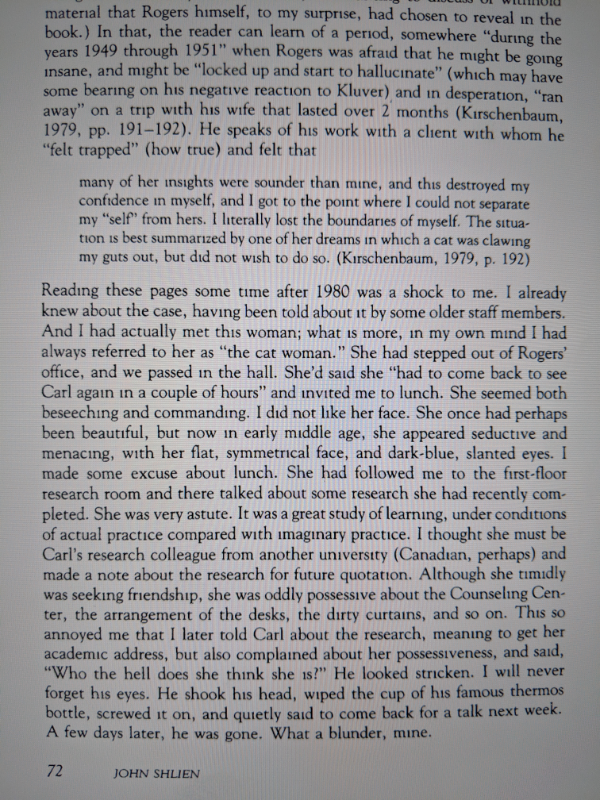
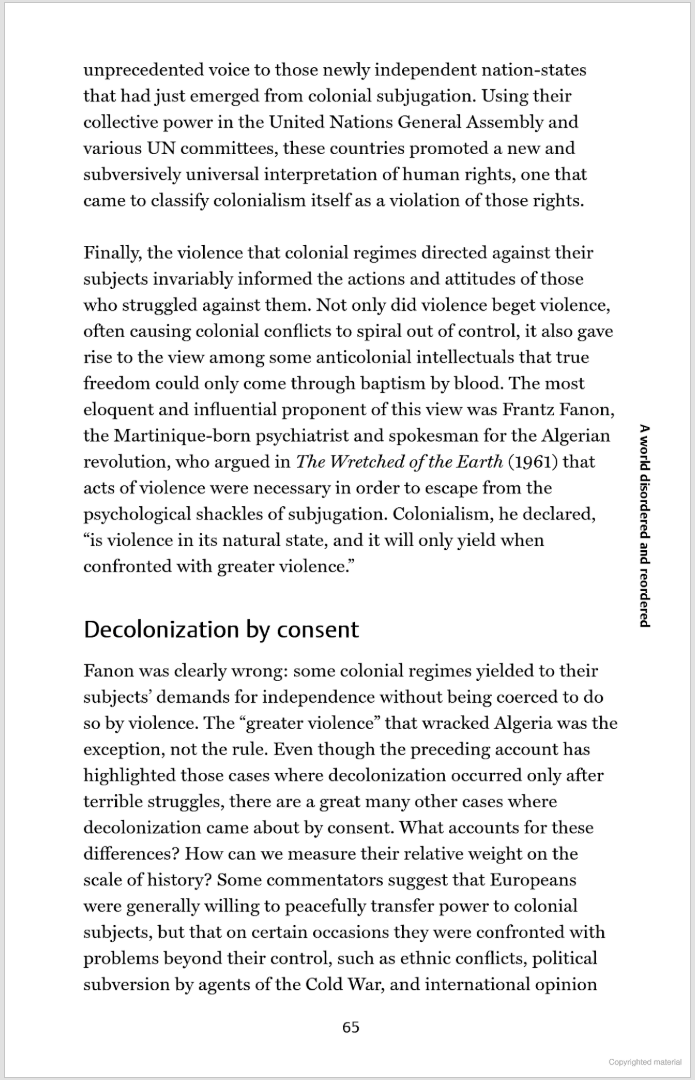
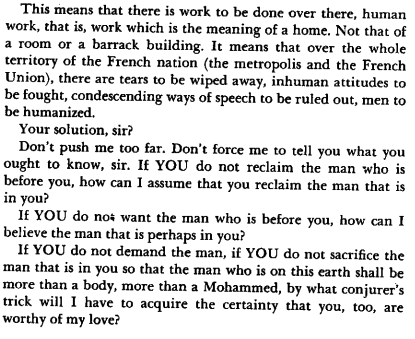


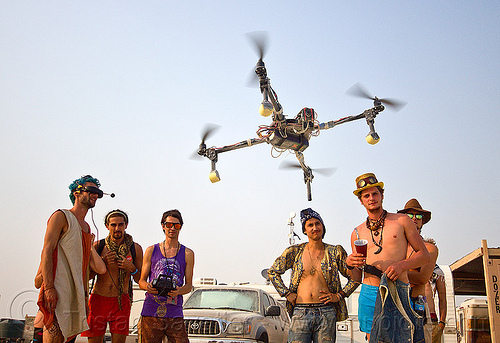
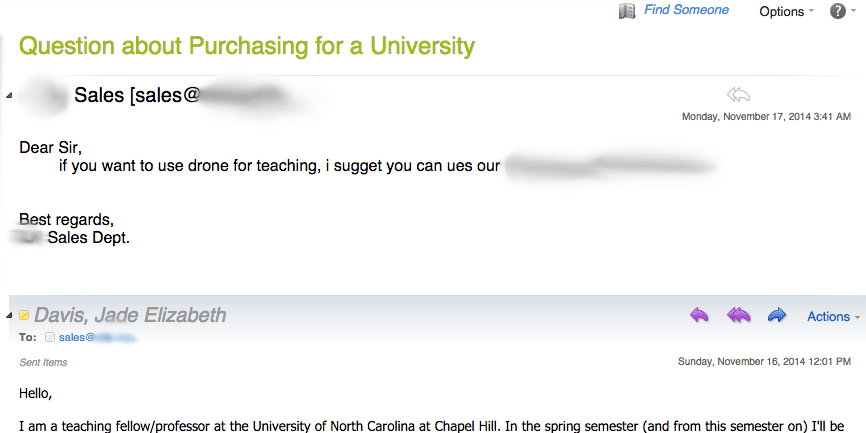
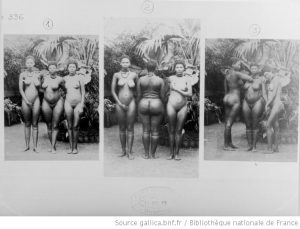 My relationship with these images is complicated. I will be addressing it in my dissertation (and I addressed part of it in my article). I mean, that part is basically written… the nuts and bolts of it is this though is, often people chose to go to these expositions. We cannot know why. But, often times, these images that come from these awful practices are the only reflections we see of bodies that look like ours in the historical photographic archive. And if we can step out of the colonial framing for a moment, and look again, maybe we’ll see something else. Maybe we’ll even find a name. For instance, the woman on the right in this series of photos is named Bebye Rooi.The names of the other two have been lost to history. I know her name because of the amazing work of Deborah WIllis and Carla Williams, who use one of the photos from this series in their book “The Black Female Body: A Photographic History”.
My relationship with these images is complicated. I will be addressing it in my dissertation (and I addressed part of it in my article). I mean, that part is basically written… the nuts and bolts of it is this though is, often people chose to go to these expositions. We cannot know why. But, often times, these images that come from these awful practices are the only reflections we see of bodies that look like ours in the historical photographic archive. And if we can step out of the colonial framing for a moment, and look again, maybe we’ll see something else. Maybe we’ll even find a name. For instance, the woman on the right in this series of photos is named Bebye Rooi.The names of the other two have been lost to history. I know her name because of the amazing work of Deborah WIllis and Carla Williams, who use one of the photos from this series in their book “The Black Female Body: A Photographic History”.